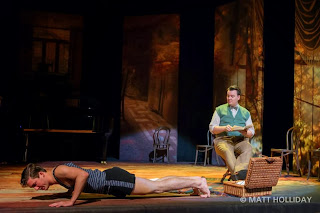 |
| Dominic Sedgwick and Adam L Sullivan as Britten and Auden photo Matt Holliday |
Burnside takes three entirely separate strands of plot, Britten's relationship with W.H.Auden culminating in Auden's famous letter to Britten in 1942; Rimbaud's relationship with Verlaine culminating in Verlaine's trial, their split and Rimbaud's journey to East Africa; forming the glue between these is a group of present day music students studying and performing Verlaine settings notably Britten's songs but also Debussy and Faure. In both historical strands we have a relationship and a journey, with Britten journeying to the USA to visit Auden and then, journeying back, Rimbaud and Verlaine travel to London and Brussels, it is in London that much of Rimbaud's Illuminations is written.
Burnside runs the Auden/Britten and the present day strands pretty straightforwardly but his Rimbaud/Verlaine strand dots about in time. The whole piece starts with Rimbaud dying and dictating a letter to his sister (including a completely non-existent place). All of the letters that Burnside uses are completely true as is the play's most outrageous moment, when Rimbaud masturbates into a cup of milk and then gives it to his then lover to unwittingly drink.
 |
| The glass of milk moment - Steffan Donnelly, Bertie Watson, Joanne Evans, Jevan McAuley as Rimbaud and friends photo Matt Holliday |
Another streak of brilliance is that the play is very funny and, like the episode with the milk, Burnside wears his learning lightly and ensures we are both challenged and amused. The young modern day students give a platform for thoughts and suggestions about the linking between the two great geniuses, but they are also characters in their own right and experimenting with their own forms of love and relationship.
Anyone who has seen one of Burnside's plays before will be familiar with his method, the music and the songs are split up and allocated to various performers, with Les Illuminations sung by various singers, as well as in ensemble. We hear other songs of Britten's from the 1930's and 1940's though Burnside was a little too reliant on the 1944 choral piece A Shepherd's Carol with extraordinary words 'O lift your little pinkie and touch the winter sky'.
When Verlaine was in jail in Brussels we heard him singing RVW's The sky above the roof (a setting of Mabel Dearmer's translation of Verlaine), as well as two of Faure's Verlaine settings (Spleen and Une Sainte en son aureole) and Debussy's Chevaud de bois. (Another delightful point brought into the play was mother-in-law as the piano teacher to the young Debussy).
The cast were lead by two recent graduates from the Guildhall School, Steffan Donnelly and Paapa Essiedu. Donnelly was remarkably vivid and life-like as Rimbaud, whist Essiedu played his African servant Djami. Both Donnelly and Essiedu are acting alumni, the remaining cast were all undergraduate and post-graduate singers and pianists (the pianists were expected to sing and act too), in total a cast of 27 people, bringing to life the people around Rimbaud and Britten as well as students, plus the five vowels! Rimbaud wrote a poem characterising the vowels, and Burnside brought them to life as five young women who accompany Rimbaud on his journey, a way of bringing Rimbaud's extraordinary thought processes to life.
Performances were strong from everybody, with Dominic Sedgwick as Britten, Adam L Sullivan as Auden and Gethn Lewis as Isherwood, all delightfully accurate. In France, Dominic J. Walsh was perhaps a little too personable as Verlaine, with Agathe Peyrat as his wife and Roisin Walsh as his mother in law.
The play will probably not have life outside a conservatoire, the cast is simply too big, but Burnside and the students vividly brought the fascinating conjunction of Britten and Auden to life in a work which as both illuminating, challenging, entertaining and laugh-out-loud funny.
Elsewhere on this blog:
- WIN a copy of Music: The Definitive History our latest Competition
- Taking Music Further - Orchestras Live conference
- Giorgio Berrugi at Rosenblatt Recitals
- Handel's Israel in Egypt at the Royal Hospital
- Lily Afshar and the Collaborative Orchestra
- Sheer delight - Gallay horn trios and quartet - CD review
- Sweet indeed - Douce France - Anne Sofie von Otter - CD review
- Mesmerising and Magical - Breaking the Rules - BREMF
- 40th Birthday - Tallis Scholars in Taverners Missa Gloria Tibi Trinitas - CD review
- Music and Murder - Passion and the Princess - Musica Secreta at BREMF
- We take a second, longer look at Les Vepres Siciliennes at Covent Garden
- Imaginative programme - Francesco Meli in Liszt and Britten - CD review
- Home



.jpg)

.jpeg)





.jpeg)